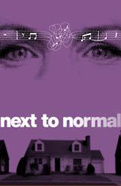Brian Yorkey: The Inescapable Pull of Next to Normal
About the author:
From artistic director of the Columbia University Varsity Show to Broadway—that’s the journey Brian Yorkey has taken with his college buddy, composer Tom Kitt, as librettist/lyricist of the acclaimed musical Next to Normal. It’s a dream come true for Yorkey, who’s had one other show produced off-Broadway and at regional theaters Making Tracks, worked on staff at a theater in Washington state and kept busy developing film and TV projects. The success of Next to Normal, about a family’s attempts to cope with the mother’s mental illness, comes after a development process that began more than seven years ago, when the show was called Feeling Electric. Less optimistic souls might have lost hope that this unusual musical would ever find an audience, but there was something about the characters and the poignant storyline that kept Yorkey and Kitt focused and enthusiastic. And it paid off, in spades! Below, Yorkey describes the road to a happy Broadway ending.![]()
It’s a cold night in March, and I’m standing with Alice Ripley on 45th and Eighth, down the street from the Booth Theatre, where Next to Normal is about to begin previews. Alice has a request for me: She wants me to write a few sentences on why I created with my friend and colleague, Tom Kitt the musical Next to Normal, and what it all means to me.
Wait a minute. I’m talking with Alice Ripley?
And my name is on the wall at the Booth Theatre?
How in the hell did THIS happen?
I keep expecting someone to realize that a terrible mistake has been made. Some important person will show up, waving a padfolio of some sort, and send us all home. But it hasn’t happened yet. So here I stand, with Alice, in the rain, wondering how this all came to be.
Tom and I first created the musical that would become Next to Normal as the final project for the first year of the BMI Workshop. We expected everyone to hate it, but they didn’t. Not everyone. The following year in the workshop, we worked on our musical adaptation of Jerry Maguire—ask Tom to play you “Show Me the Money” sometime. But we kept coming back to this odd little show. We couldn’t shake it.
And we discovered other people couldn’t shake it either. Every reading, every workshop, we expected it would be the end of the line. “Well, we never thought we’d get this far,” we’d tell each other, “so if it ends here, that’s fine.” But it kept not ending.
Why is that? Why this show? Why did we devote large chunks of our lives to Feeling Electric, which became Next to Normal? An all-original musical is hard. There’s no framework for your story, no characters in place, nothing. You start from scratch, and sometimes—like this time—it takes you a long, long time to find your story.
So why’d we do it?
Because we learned, working on the Varsity Show at Columbia, the thrill of creating something out of nothing. We had a saying then, and it still applies: You just make shit up.
Because we were too young to know better.
Because when we got old enough to know better, we couldn’t walk away from this crazy show. Note to younger writers: Outline. I know it feels like school, and it sucks, but do an outline. Or spend many years writing your musical. Up to you.
Because there is no feeling like the feeling you get hearing Alice Ripley sing words you wrote, to stunning music by Tom Kitt, in a show directed by the amazing Michael Greif, produced by David Stone, in front of 700 people who are listening very carefully.
Because this was a story that mattered to us, even when we didn’t entirely know what it was. It was a story about people very much like people we know, and about how our mind and heart and soul can hurt, and the best efforts and deepest love of those who care for us can fail to ease that hurt. And it’s about how in the midst of that hurt, life goes on, and we still laugh. It’s a story about all of us. The ads say it’s a story about “a family in crisis.” But what family isn’t?
Because we’d never seen a story like this as a musical, and we wanted to.
Because I remember being a sensitive kid from Seattle, who came to New York for college because that’s where the Broadway is, sitting in the dark of the Golden Theatre at Falsettos when Chip Zien sang “homosexuals” and pointed his little flashlights at me and my date. I remember stumbling out of the St. James after seeing Tommy, knowing theater would never again be the same for me. Tap-dancing, quite badly, out of Noise/Funk, knowing I had never seen anything like that before and probably never would again. Seeing both parts of Angels in America on consecutive nights, dizzy, disoriented, crying, laughing, changed forever. That list goes on.
Because I live for those world-shaking, ass-kicking, completely transporting evenings in the theater. And if Next to Normal could be that experience for someone—maybe some other sensitive kid from somewhere—if I could be a part of creating a show that catches that kid by surprise and shakes his world and sends him stumbling into the night, thrilled and destroyed and changed...if I could do that?
That would be cool.
So, Alice, that’s more than a few words and more than Broadway.com asked for but that’s why I wrote Next to Normal. I never dreamed it would end up here, at the Booth Theatre on Broadway, with you and the rest of this wonderful cast, crew and staff. But here we are—and I know Broadway has given us all many memorable evenings, and we’re hoping we can return the favor.
